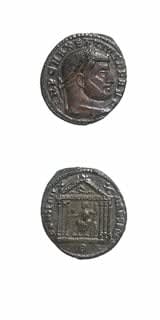Bronze Follis of Emperor Maxentius, 306 CE - 312 CE
Bronze
C.7016
Obverse: IMP C MAXENTIVS PF AVG; Laureate Bust of the Emperor Facing Righ Reverse: CONSER VRB SVAE; Cult Image of Roma in a Temple with Six Columns Marcus Aurelius Valerius...
Obverse: IMP C MAXENTIVS PF AVG; Laureate Bust of the Emperor Facing Righ
Reverse: CONSER VRB SVAE; Cult Image of Roma in a Temple with Six Columns
Marcus Aurelius Valerius Maxentius was the son of Emperor Maximianus who ruled the Western Empire from 286 A.D. until he was forced to abdicate by Diocletian in 305 A.D. The next year, in 306 A.D., Emperor Galerius decided to tax the citizens of Rome who, until this point in history, were considered privileged and above taxation. Naturally, this decision incited a popular uprising. The citizens of Rome chose Maxentius and their leader and he encouraged his father to come out of retirement and join him on the throne. Together, they succeeded in seized control of the Italian peninsula. Soon after, Constantine, at their invitation, joined their rebellion. However, when Maxentius and his father had a falling out, Maximianus fled to the court of Constantine, seeking protection from his son’s wrath. Now with three factions fighting for control of the empire, the Roman world was on the verge of another civil war. Diocletian promptly organized a peace conference in 308 A.D. at Carnuntum. Although he was declared a public enemy, Maxentius managed to maintain control of Italy for four more years, until Constantine’s forces defeated him at the famed Battle at the Milvian Bridge, where Constantine’s victorious forces first fought under the sign of Christ.
How many hands have touched a coin in your pocket or purse? What eras and lands have the coin traversed on its journey into our possession? As we reach into our pockets to pull out some change, we rarely hesitate to think of who might have touched the coin before us, or where the coin will venture to after it leaves our hands. More than money, coins are a symbol of the state that struck them, of a specific time and location, whether contemporary currencies or artifacts of a long forgotten empire. This stunning hand-struck coin reveals an expertise of craftsmanship and intricate sculptural detail that is often lacking in contemporary machine-made currencies. This ancient coin is a memorial to an emperor, passed from the hands of civilization to civilization, from generation to generation that still appears as vibrant today as the day it was struck.
Reverse: CONSER VRB SVAE; Cult Image of Roma in a Temple with Six Columns
Marcus Aurelius Valerius Maxentius was the son of Emperor Maximianus who ruled the Western Empire from 286 A.D. until he was forced to abdicate by Diocletian in 305 A.D. The next year, in 306 A.D., Emperor Galerius decided to tax the citizens of Rome who, until this point in history, were considered privileged and above taxation. Naturally, this decision incited a popular uprising. The citizens of Rome chose Maxentius and their leader and he encouraged his father to come out of retirement and join him on the throne. Together, they succeeded in seized control of the Italian peninsula. Soon after, Constantine, at their invitation, joined their rebellion. However, when Maxentius and his father had a falling out, Maximianus fled to the court of Constantine, seeking protection from his son’s wrath. Now with three factions fighting for control of the empire, the Roman world was on the verge of another civil war. Diocletian promptly organized a peace conference in 308 A.D. at Carnuntum. Although he was declared a public enemy, Maxentius managed to maintain control of Italy for four more years, until Constantine’s forces defeated him at the famed Battle at the Milvian Bridge, where Constantine’s victorious forces first fought under the sign of Christ.
How many hands have touched a coin in your pocket or purse? What eras and lands have the coin traversed on its journey into our possession? As we reach into our pockets to pull out some change, we rarely hesitate to think of who might have touched the coin before us, or where the coin will venture to after it leaves our hands. More than money, coins are a symbol of the state that struck them, of a specific time and location, whether contemporary currencies or artifacts of a long forgotten empire. This stunning hand-struck coin reveals an expertise of craftsmanship and intricate sculptural detail that is often lacking in contemporary machine-made currencies. This ancient coin is a memorial to an emperor, passed from the hands of civilization to civilization, from generation to generation that still appears as vibrant today as the day it was struck.



